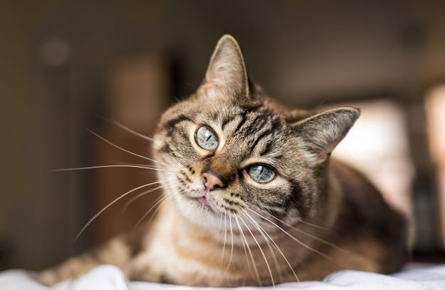Dental care is a valuable part of your Rabbit's oral care routine. If good oral hygiene is not kept up on a regular basis, periodontal disease will likely recur and cause problems for your pet. Here at Woodward, we recommend regular checkups every six months alongside home dental care.
Rabbit's teeth continue to grow throughout their lives, which allows them to grind down course feed substances such as grass and plants in the wild. Many domestic rabbits are fed a combination of hay and commercially available diets. Commercially available diets are lower in fibre and higher in protein, fat and energy. This means that rabbits quickly achieve their nutritional requirements, unlike in the wild when they would need to graze all day and forage to meet the same energy intake from food. This can not only lead to obesity and boredom, but it can also lead to dental disease due to lack of wear of the teeth. Less time grinding and a lower intake of indigestible fibre can lead to the formation of molar spurs, which if severe, and allowed to progress, can cause tongue and cheek lacerations.
This can also cause secondary issues as indigestible fibre and chewing also promotes gastrointestinal motility, so diets low in fibre and higher in carbohydrates (such as muesli or pelleted diets) can cause the gut motility to slow.
Rabbits are hindgut fermenters, meaning that they rely on bacteria within their hindgut to break down and absorb food. Changing the pH and microflora can therefore lead to diarrhoea, gut stasis and, unfortunately, in some cases, death, because of this, a weight-reduction plan is an essential element in keeping your rabbit wholesome and happy.
 Signs Of Rabbit Dental Disease
Signs Of Rabbit Dental Disease
-
Reduced appetite or not eating at all
-
Reduced number of faecal pellets produced
-
Reduced or inability to ingest caecotrophs – leading to a 'messy bum.'
-
Runny Eyes
-
Hypersalivation and drooling
-
Facial swelling due to secondary dental abscess
If you discover any of the above symptoms, please contact the Woodward Veterinary team to make an appointment for a vet to examine your rabbit as soon as possible.
What is Rabbit Dental Disease?
If the front teeth (incisors) are too long, these can be shortened, this is usually performed on a conscious rabbit, but this depends on temperament.
If there is malalignment of the incisors (meaning that they don't contact each other when closed), then shortening the teeth may provide a temporary fix, but the extraction of all incisors may be more appropriate to prevent the need for regular burring – this is something your vet would advise you on.
If your vet suspects there is spurring (sharp edges) of the back-cheek teeth (molars), a general anaesthetic will be required to facilitate a thorough examination and treatment.
What Can I Do To Help Prevent Rabbit Dental Disease?
Feed a well-balanced diet high in fibre; a rabbit's diet should be mainly made up of hay (80-85%). As a guide, this means that a rabbit should eat their body size in hay a day. This increases grinding, dental wear and promotes intestine movement.
Pellet foods are advised over mixed muesli as rabbits will pick their favourite parts of the food, often leaving the most nutritional parts. Feed a maximum of one tablespoon per day for dwarf and standard rabbits and two tablespoons for giant breeds.
If you need help and advice on introducing daily brushing to your dog, the team at Woodward Veterinary Practice is happy to help, just ask for more details at the surgery.
Rabbit Dental Care FAQs
Why do a rabbit’s teeth grow continuously?
Rabbits' teeth grow continuously throughout their lives, typically about 2-3mm per week. This natural growth helps compensate for the wear and tear caused by their fibrous diet in the wild. Domestic rabbits need a similar diet to keep their teeth properly worn down.
How can I prevent my rabbit’s teeth from overgrowing?
Feeding your rabbit a diet high in fiber is the best way to naturally wear down their teeth and prevent overgrowth. A diet that includes:
- Unlimited hay (such as timothy or meadow hay) should be the main component of your rabbit’s diet.
- Fresh vegetables and greens provide additional fiber.
- Specially formulated rabbit pellets should be given in moderation, as they don't wear down teeth as effectively as hay.
Can dental problems in rabbits cause other health issues?
Yes, untreated dental problems can lead to serious health complications. Rabbits with dental pain may stop eating, leading to gastrointestinal stasis (a life-threatening condition where the digestive system slows down). Dental infections can also spread to the jawbone or cause abscesses, which are difficult to treat.
How often should I check my rabbit’s teeth at home?
It’s a good idea to check your rabbit’s teeth at home every few weeks. Look for any signs of overgrowth, discoloration, or misalignment. If you notice anything unusual, such as difficulty eating or visible overgrowth, contact your vet for an examination.
Can dental issues in rabbits be genetic?
Yes, some rabbits, especially dwarf breeds and lop-eared breeds, are genetically prone to dental issues due to their skull shape. These rabbits may have shorter or misaligned jaws, which can lead to malocclusion or overgrown teeth. Regular dental care and vet visits are especially important for these breeds.
Can I brush my rabbit’s teeth?
No, rabbits do not need their teeth brushed like dogs or cats. Their teeth are worn down naturally through chewing fibrous food, especially hay. However, keeping an eye on their teeth for signs of overgrowth or misalignment and ensuring they have a proper diet is essential.



